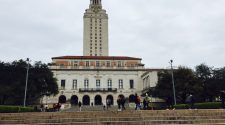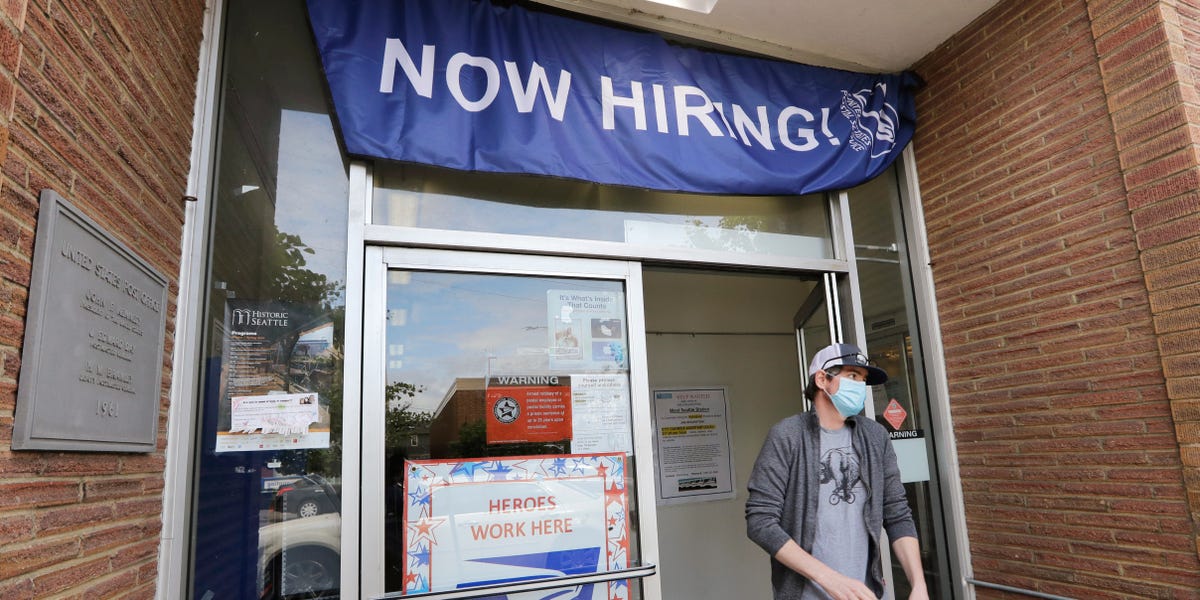- The July jobs report, released Friday, said that US employers added 1.8 million jobs during the month and that the unemployment rate declined to 10.2%.
- That beat economists’ expectations of 1.5 million payrolls added in July and a 10.5% unemployment rate.
- The report indicated progress in the labor-market recovery from the coronavirus recession, but it also signaled that the pace of the recovery is slowing.
- Here’s what five economists said about the July report.
- Visit Business Insider’s homepage for more stories.
The July jobs report, released Friday, beat expectations, saying that US employers added 1.8 million jobs during the month and that the unemployment rate decreased to 10.2%. Economists had expected to see 1.5 million jobs added, with unemployment at 10.5%.
While positive, the report also indicated that the labor-market recovery from the coronavirus recession was losing speed. The July figure was much less than the 4.8 million jobs added in June and the 2.7 million added in May.
“It’s great to see progress, but the speed of progress has slowed down and we’re still far from any sort of healthy labor market right now,” Nick Bunker, an economist at Indeed, told Business Insider.
Employment remains down 12.9 million jobs from its pre-pandemic February level, the report said, meaning that only about 42% of the jobs lost during the crisis have been recovered. Bunker pointed out that the cumulative hit to unemployment and the new unemployment rate were still worse than during the Great Recession.
Here’s what five economists said about the July jobs report.
Read more: A stock chief for $7.3 trillion BlackRock told us how he’s investing to get the best returns — and his top picks for maximum income as Wall Street faces the threat of mass dividend cuts
1. Indeed: ‘The next few months are a race against the clock’
“Early in the crisis, job losses were because people were in businesses that were reticent to engage in consumption or investment, because they were concerned about the virus itself,” Bunker told Business Insider. “Now it’s a broader, more systemic economic damage than just the public health.
“We always need to appreciate progress, but there’s no indication that it’s fast enough,” Bunker said. “The next few months are a race against the clock.
“We want to see really strong gains over the next few months to make sure we can get to a spot where these folks on temporary layoff get jobs,” he added. “If a portion of them don’t find or end up in a more permanent form of employment, the bounce back is going to be much slower.”
Read more: Investors are piling into socially responsible ETFs at an unprecedented rate — and Morgan Stanley says these 4 stocks are best-positioned to profit from the trend
2. Bank of America: ‘The recovery didn’t stop, but it slowed’
“There’s a slowdown in job creation for the last few months, but we still are seeing further healing in the labor market,” the Bank of America economist Michelle Meyer told Business Insider.
Meyer added that “the recovery didn’t stop, but it slowed.”
Given the number of workers affected by the pandemic, “it will take time to fully heal the labor market and bring those workers back into full employment,” she said. “But progress is being made.”
The path ahead is likely to be bumpier, Meyer said, and “depending on the part of the economy you’re focusing on, you’re probably going to see a little bit of a different story depending on the region, depending on the path of the virus, depending on stimulus.”
Read more: BANK OF AMERICA: Buy these 5 commodities now for profits into next year as pandemic uncertainty boosts their prices and lifts gold to $3,000
3. Glassdoor: ‘The report exposes cracks’
“The report exposes cracks in efforts to reopen as employers struggle to deal with resurgent outbreaks around the country,” the Glassdoor economist Daniel Zhao said in a note. “The slowdown in the rate of recovery amid a worsening pandemic shows that a sustainable return to economic normal is hinged on first addressing the public health crisis.
“Today’s jobs report comes at a critical juncture,” he added. “Not only is it the first jobs report to capture the impact of the resurgent pandemic on American workers, it also coincides with Congressional negotiations on financial relief for many millions of Americans. And with less than three months until the election, attention on the coming jobs reports will likely heighten.
“Today’s report increases the pressure on policymakers to extend financial relief to avoid the slowdown from turning into a full-blown double-dip recession,” Zhao added.
4. Euler Hermes: ‘Years before we get back anything like full employment’
“We should walk away with it in general saying, ‘OK, this was a big chunk of jobs that we got back,'” Dan North, a senior economist at Euler Hermes North America, told Business Insider. “It would be an unthinkable gain monthly gain before the pandemic.”
Still, there “are some other considerations here,” North said. One is that “you have to ask how sustainable these gains are” — if there’s another wave of COVID-19, many of the jobs re-added in industries such as leisure and hospitality and retail trade could be on the chopping block again.
North also described the bulk of re-added jobs as “low-hanging fruit,” or workers on temporary layoff returning to businesses as they reopened.
“It’s still probably going to be a couple of years before we get back anything like full employment,” North said.
Read more: Harding Loevner’s global stock fund has trounced the market for over 30 years. Here’s an inside look at the simple 4-part stock-picking criteria that helped the firm balloon to $72 billion.
5. Jefferies: ‘The labor market remains stunningly resilient’
The July job gains “can only be described as solid,” Aneta Markowska, a chief economist at Jefferies, wrote in a note. “In the face of the covid resurgence and a growing headwind from PPP loans, the labor market remains stunningly resilient.”
She continued: “Even more surprising was the fact that covid-sensitive sectors were among the fastest growing industries in July (albeit much slower than in May/June).
“The near-term outlook for the labor market and the economy will be highly dependent on fiscal policy,” Markowska said. “Ironically, today’s report might be a setback for fiscal negotiations as it will strengthen the conservatives’ belief that no more help is needed.”
Read more: Morgan Stanley’s top transportation analyst shared with us his playbook for profiting from the space-investing boom — and explained why SpaceX could be in a ‘winner-take-all’ position













-225x125.jpeg)

